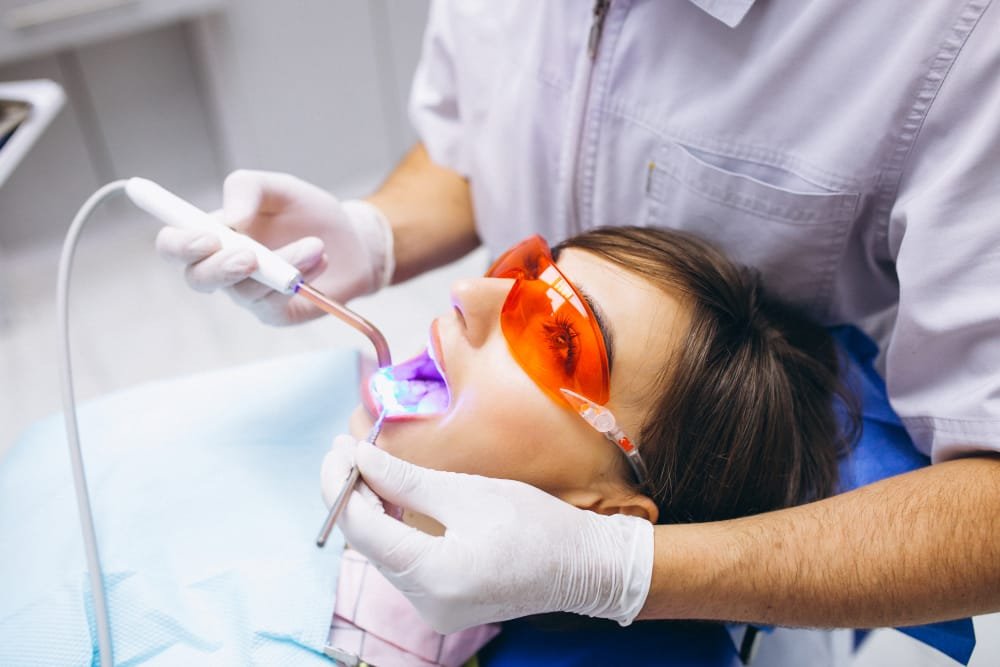Introduction to Laser Teeth Whitening
A bright, confident smile has always been seen as a universal symbol of health, vitality, and self-assurance. In recent years, the UK has witnessed a surge in demand for cosmetic dentistry, and one of the most popular treatments is laser teeth whitening. Sometimes marketed as “power whitening,” this procedure promises dramatic results in as little as one appointment.
But is it worth the cost, time, and possible side effects? That’s the question most patients ask before committing to the treatment. In this comprehensive guide, we’ll break down how laser whitening works, what it costs in the UK, who it’s suitable for, its pros and cons, and whether it’s truly worth it compared to alternatives.
The Rising Demand for Cosmetic Dentistry in the UK
Cosmetic dentistry is no longer just for celebrities. According to multiple UK dental surveys, more than 40% of adults have considered teeth whitening, and around 20% have undergone some form of whitening treatment in the last decade. Factors such as social media, selfies, and an increased focus on personal aesthetics have made white teeth a cultural priority.
Why Teeth Discoloration Happens
To understand whitening, we need to understand staining. Tooth discoloration can be:
-
Extrinsic stains – caused by coffee, tea, red wine, smoking, or curry.
-
Intrinsic stains – caused by aging, trauma, certain medications (like tetracycline), or genetic factors.
-
Restoration mismatch – fillings, crowns, and veneers that remain static while natural teeth darken over time.
Laser whitening is particularly effective for extrinsic stains and moderate age-related discoloration, though it has limitations with intrinsic stains.
What is Laser Teeth Whitening?
How the Process Works Scientifically
Laser whitening uses a peroxide-based gel (usually hydrogen peroxide or carbamide peroxide). Once applied to the teeth, a concentrated light source marketed as a “laser” is used to accelerate the chemical reaction. The laser excites peroxide molecules, producing reactive oxygen species that break down stain molecules lodged inside enamel and dentin.
This process doesn’t “burn away” stains but chemically alters the chromophores (colored molecules), making them appear lighter.
Key Differences Between Laser, LED, and Traditional Whitening
It’s important to clarify terminology:
-
Laser Whitening – uses a true laser light source, often more precise but expensive.
-
LED Whitening – uses high-powered LED lamps to activate the gel.
-
Traditional Whitening – peroxide gel used without light activation.
In practice, many UK clinics market LED or halogen light-assisted whitening as “laser whitening.” While light activation may speed up results, studies suggest the difference in final whitening is modest compared to well-administered non-light methods.
The Procedure: What to Expect in a UK Clinic
Pre-Treatment Consultation and Oral Exam
A reputable dentist will first:
-
Check for cavities, gum disease, or cracks (which could worsen with bleaching).
-
Record baseline tooth shade.
-
Discuss your goals and set realistic expectations.
Patients with heavy restorations, exposed dentine, or severe discoloration may be advised against the treatment.
Step-by-Step Breakdown of the Session of laser teeth whitening
-
Cleaning – Professional scaling/polishing to remove surface debris.
-
Protection – A rubber dam or gel barrier applied to gums, lips, and soft tissues.
-
Application of Whitening Gel – Peroxide gel placed evenly on visible tooth surfaces.
-
Laser/Light Activation – Light directed at teeth for 10–15 minutes.
-
Reapplication – Gel may be reapplied and activated 2–3 times.
-
Rinse & Shade Check – Final shade compared to initial records.
Recovery and Aftercare Instructions
-
Avoid coffee, tea, red wine, and smoking for 48 hours (“white diet”).
-
Mild sensitivity is common for 24–48 hours.
-
Dentists may recommend desensitising toothpaste or fluoride gels.
Costs of Laser Teeth Whitening in the UK
Average Price Range of laser teeth whitening (2025 Update)
-
£300–£1,000 per session is the typical range across UK clinics.
-
London and major cities often lean toward £500–£800.
-
Regional or smaller clinics may advertise offers around £300–£450.
Cost Comparison with Alternative Whitening Methods
-
Dentist take-home trays: £200–£400
-
Non-laser in-office whitening: £300–£700
-
Over-the-counter strips/pastes: £20–£100
laser teeth whitening sits at the premium end of the spectrum, largely because of speed and the immediate “wow” factor.

Effectiveness of Laser Whitening
How Many Shades Whiter Can You Realistically Expect?
Most clinics claim 2–8 shades lighter after one session. For many patients, the average improvement is 3–5 shades.
Longevity of Results and Maintenance Needs
-
Results may last 12–24 months with good oral hygiene and diet.
-
Smokers, heavy tea/coffee drinkers may notice relapse within 6–12 months.
-
Many patients use at-home trays every 6 months for maintenance.
Benefits of Laser Teeth Whitening
Immediate Results in One Session
Unlike take-home kits, laser whitening offers visible improvement in just 1–2 hours.
Confidence and Psychological Benefits
A brighter smile often boosts confidence in social and professional interactions.
Professional Supervision Ensures Safety
Unlike unregulated “beauty salons,” UK dentists are trained and registered with the GDC, ensuring protective measures are in place.
Risks and Side Effects
Sensitivity and Gum Irritation
The most common side effect. Typically temporary, lasting 24–48 hours.
Potential Enamel Damage
Repeated aggressive whitening can weaken enamel, though a single session is unlikely to cause harm.
Problems with Crowns, Veneers, and Fillings
Restorations do not bleach, leading to mismatched shades. Patients may need replacements after whitening.
Who is an Ideal Candidate?
Best Candidates for Laser Whitening
-
Healthy teeth and gums
-
Yellow or moderate stains
-
No major restorations in visible areas
-
Realistic expectations
Who Should Avoid the Procedure
-
Pregnant or breastfeeding women
-
People under 18 (developing teeth)
-
Patients with gum disease, cavities, or severe sensitivity
-
Those with many crowns or veneers

Alternatives to Laser Teeth Whitening
Dentist-Supervised Home Whitening Kits
Custom trays with lower-concentration peroxide gel. Slower but safer.
In-Office Non-Laser Whitening
Similar peroxide gel, without light activation. Results are nearly comparable.
Over-the-Counter Whitening Products
Toothpastes, strips, pens – cheap but limited effectiveness.
Clinical Evidence and Research
Studies suggest that light-assisted whitening accelerates bleaching, but the long-term difference compared to peroxide-only treatments is minimal.
The British Dental Association (BDA) advises that patient expectations should be realistic, and whitening should only be done by registered professionals.
How to Choose the Right Clinic in the UK
Checking GDC Registration and Qualifications
Always verify your dentist is registered on the General Dental Council (GDC) website.
Red Flags: Cheap Deals and Unlicensed Providers
Be cautious of salons or online ads offering “laser whitening” for under £100. These often use unregulated gels or unqualified practitioners.
Looking after best laser teeth whitening in Lymm ? At Smilebay in Lymm Cheshire, we provide preventive advice, professional hygiene visits, and tailored treatments to keep your gums and teeth healthy. 👉 Book your appointment today.
Aftercare and Maintenance Tips
Foods and Habits to Avoid
-
Dark drinks: tea, coffee, red wine
-
Smoking or vaping
-
Acidic foods immediately after whitening
At-Home Top-Up Treatments
Many dentists provide low-strength peroxide kits to maintain results every 6–12 months.

Real Patient Experiences
Success Stories and Testimonials
Patients often report an instant boost in confidence, especially for weddings, job interviews, and public-facing roles.
Cases Where Results Didn’t Last
Some patients note that within 6 months, staining began to return, particularly if they didn’t change lifestyle habits.
Is Laser Whitening Worth It in the UK?
Cost-Benefit Analysis
-
Worth it if you need fast, dramatic results and are willing to maintain them.
-
Less cost-effective if your stains are mild, or if you’re comfortable with gradual whitening via trays.
When It’s Worth the Investment
-
Special occasions (weddings, media work)
-
Moderate stains without restorations
When Other Methods May Be Better
-
If you have budget concerns
-
If you prefer gradual, sustainable whitening
Disclaimer: This article is for general informational purposes only and should not be relied upon as medical or dental advice. Always consult your dentist or healthcare professional for personalised guidance.
FAQs
Q1. How much does laser teeth whitening cost in the UK?
Around £300–£1,000 depending on location and clinic.
Q2. How long do results last?
Typically 12–24 months, depending on diet and habits.
Q3. Is it safe?
Yes, when performed by a GDC-registered dentist. Risks include sensitivity and gum irritation.
Q4. Can it whiten crowns or veneers?
No, only natural teeth respond to bleaching.
Q5. What’s the biggest advantage over home kits?
Speed results in one session.
Q6. Can anyone get it done?
Not recommended for pregnant women, minors, or those with untreated dental issues.
References
-
British Dental Association (BDA) – www.bda.org
-
Dentaly UK – “Teeth Whitening Costs” (dentaly.org)
-
WhatClinic – UK Laser Whitening Prices (whatclinic.com)
-
NHS – Teeth Whitening Regulations (nhs.uk)
-
General Dental Council (GDC) – Verify a Dentist (gdc-uk.org)




